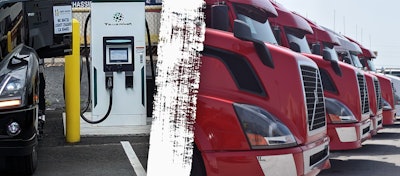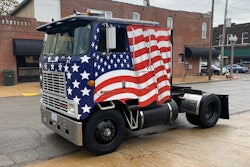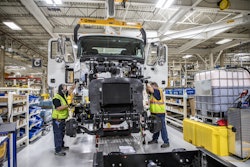
In Overdrive and sister publication CCJ''s survey this year around electric-drive Class 8 truck interest and adoption, support infrastructure and outlook, owner-operators and fleets were asked to name the "biggest obstacle" to widespread trucking adoption. The survey revealed the electric trucks' residual value and cost of ownership unknowns were a major concern. For battery-electric Class 8s, 16% of owner-operators earmarked those unknowns as the most significant hurdle for the rigs to clear.
Fleets in CCJ's audience picked that obstacle at similar rates, generally the second-biggest vote getter for both battery-electric and hydrogen fuel cell-electric Class 8s. All the concern with long-term value begged another question.
What does -- or more realistically, will -- the resale market for Class 8 battery-electric trucks look like? If there is one, it could be a long time in coming, given over-the-road electric-drive realities.
"As an industry, we’re still making this up as we go along." --Steve Tam, vice president, ACT Research

ACT Research VP Tam and fellow analysts earlier this year performed "three rounds of multiclient studies," as he put it, in hopes of nailing down the likely extent of adoption of electric trucks in the future. As part of that, too, they hoped to provide what owner-operators and fleets clearly want: a reliable estimate of total cost of ownership to buyers. In the analysis, ACT left out the value of the truck for resale at the end of ownership, noting the unknown nature of how used markets might play out. There are simply so few battery-electric medium-duty and heavy-duty trucks for sale, the lack of comparables makes estimating residual value difficult.
Yet there are some examples out there. Early data suggests that, at this stage of the electric-trucks game, value of those trucks is suffering swifter declines than diesel counterparts.
Price Digests, an Overdrive sister company that closely tracks average market valuation data for commercial trucks as well as a variety of other specialty vehicles, found medium-duty cabover cab and chassis the only electric-drive application with enough used sales examples and listings to provide a relatively fair assessment of value.
Price Digests' Sam Pierce, who gathered the data shown in the charts that follow, noted the company derived its values "from what we’re seeing in market data, from a variety of sources," including "auctions and public listings, and affiliations with some of the clients. ... We try to get values for all of the available models."
Averaging values of three-year-old, 2020-built medium duty diesel and electric trucks, here's what Pierce found about just how well both groups of trucks were holding their original value on average.
By comparison, a four-year-old Class 8 conventional sleeper tractor on average has held a slightly higher percentage of its value than those three-year-old medium-duty electrics, again with the caveat that the underlying data is sparse for electric-drive trucks.
[Related: Used-truck market back in buyers' favor, but money tight as ever]
The above analysis doesn't account for the particulars of vehicles that give them value in a real market, of course -- not just age but miles, service records, particularities of engine and driveline configurations and the like. For electric trucks, among the biggest value-determining factors: Health of the batteries.
"You have to know what the health of that battery is," Tam said. In the real world, "that’s really going to dictate the starting point of what people use to decide what a vehicle is worth."
CCJ's Jason Cannon recently detailed Volvo's vision on the battery-replacement front for electric trucks in the future: a localized economy of reconditioning batteries for further mobile use and/or repurposing big battery packs for stationary energy storage.
Volvo Energy's sales engineering support chief, Elizabeth Larsson, said the localization of those processes would be key to containing second-life costs and boosting overall efficiency. "Batteries are a regional business," she said, as the second life of the battery (reconditioning) can’t take place overseas because that drives costs into a product whose best value proposition is that it's cheaper.
"The truck maker," Cannon wrote of Volvo, "is already expanding its service offerings to cover the entire truck and battery ecosystem over its lifecycle." That includes its 2022-announced Turnkey Solutions electromobility program centered on companies' charging-related needs.
[Related: Electric trucks don't stand a chance -- even in drayage -- without more power infrastructure]
Yet batteries capable of powering electric work trucks are so expensive today that Tam feels they may ultimately be electric-truck owners' most precious asset. Effective battery management will be key to getting the best value from such equipment, and life out of the truck.
Used-market development could be limited by that reality for quite a long time. Rather than trade out a truck or a battery at end of a battery's life, Tam said, a market for leasing batteries could develop, given the expense involved. He imagines it would be "hard to find a lender to put up money for that sort of purchase" with respect to used equipment, he said. "If somebody can lease the battery to put that second battery in that 10-year-old truck" maybe there's a better chance of a resale market irrespective of the battery-pack portion of the equipment.
He looks back at natural-gas-powered trucks and how used markets developed for them as a bit of a precedent. With natural gas power, "tanks to store the fuel on-board are very expensive, like batteries are right now," he said. And oftentimes, in the secondary market for such vehicles, "the seller would tank the tanks off. If somebody bought that truck they'd have to replace the tanks."
In the natural gas example, such practices, he said, "really killed the secondary market."
For electrics, Tam said he believed "there will be generally less wear and tear on these trucks," though admitted it was "speculation" at this point given so few in operation for considerable lengths of time.
If battery management/replacement becomes a sort of "cottage industry" unto itself, and durability expectations are met or exceeded, used markets for electric rigs could also be limited by the simple fact of owners hanging onto their trucks longer and longer, with fewer maintenance problems.
"We’ve got a guy here who’s got a Tesla" passenger car, Tam said. He bought it with six months' base warranty. Six months after he bought it, sure enough the battery failed. It’s a battery pack made up of individual battery cells. It needed only a few cells replaced," yet the manufacturer "gave him a reman pack under warranty, and you move on."
Read next: Electric-truck purchase incentives present big challenges for small fleets, owner-operators










